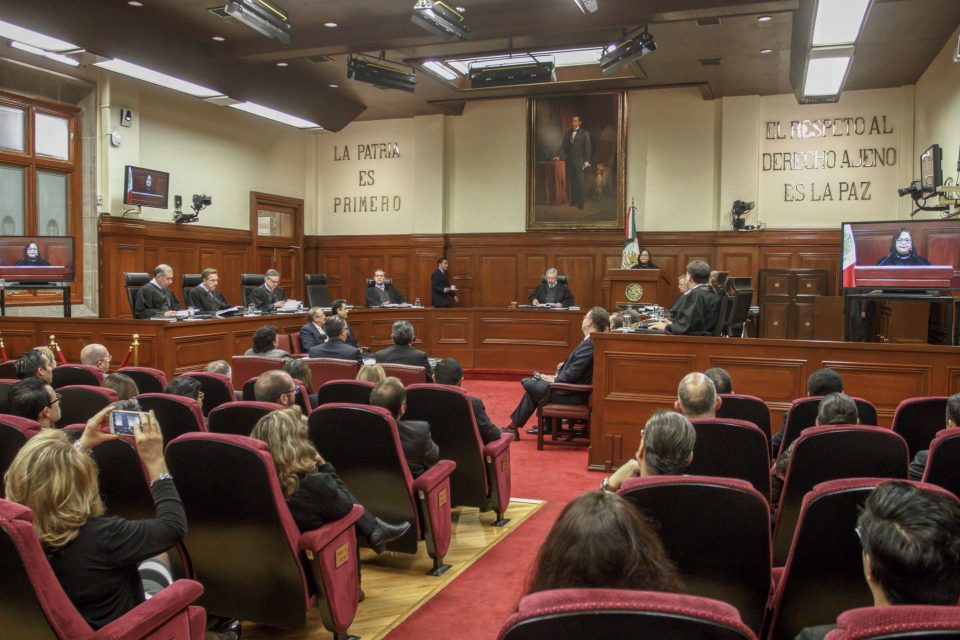
The discussion on informal pretrial detention and its application returns to the plenary session of the Supreme Court of Justice of the Nation (SCJN).
This Tuesday, the ministers will begin the debate of a new project on the subject, proposed by Minister Luis María Aguilar, who proposes that the country’s security and justice authorities stop applying this measure automatically and, instead, study its use case by case.
Within his project to resolve the action of unconstitutionality 130/2019, Minister Aguilar on this occasion proposes that the word “informal” be interpreted as the obligation of judges to open debate in all cases and of the Public Ministry to argue, provide evidence and allege what is conducive to request its application.
Last September, the Court discussed a first draft of this action of unconstitutionality, which among its main proposals proposed to annul the second paragraph of Article 19 of the Constitution, in order to completely disappear the figure of informal preventive detention in the country and declare the invalidity of several portions of Article 167 of the National Code of Criminal Procedures (CNPP).
However, after two days of discussion without the project obtaining the necessary support, Minister Aguilar decided to withdraw the document to prepare a new one that would integrate the interventions of his colleagues. The ministers, although they had arguments for and against informal pretrial detention, most agreed that it violates human rights.
Now, the minister’s bill proposes to establish that “the concept of ‘informality’ does not mean that the measure is issued automatically, but that it must be understood as a term opposed to the principle of ‘request of a party’, which leaves in the hands of criminal judges the power to evaluate each case on its own merits. and obliges them to give adequate reasons for the particular admissibility of the precautionary measure.”
To this end, it establishes the obligation of judges to study what other precautionary measures can be used to guarantee the appearance of an accused in a trial, without hindering the development of the investigation and guaranteeing the protection of the victim, witnesses or the community, or that it be the least harmful measure for the accused.
In September, the Court also heard and discussed another project on the subject, prepared by Minister Norma Piña, who, like Aguilar, proposed the invalidation of informal pretrial detention and, not obtaining sufficient support, decided to withdraw the document to prepare a new one.
Read more: Ministers agree that unofficial pretrial detention violates rights; They will make new projects to find a way that limits it
Although international organizations and civil human rights organizations maintain that unofficial pretrial detention violates human rights and can even result in a conviction without trial, the government of President Andrés Manuel López Obrador defends its application and ensures that eliminating it would lead to thousands of guilty parties going unpunished and free.
In August, López Obrador’s government published a statement calling on the judiciary to preserve unofficial pretrial detention, arguing that otherwise would affect the public security strategy.
“We ask the highest court in the country that, when resolving the aforementioned matters, consider the public security of the country, the victims of crimes, the fight against impunity and the enormous effort involved in criminal prosecution involving federal and state forces, as well as local prosecutors and the Attorney General’s Office (FGR). and that, consequently, informal pretrial detention prevails, as established by our Basic Law,” he said.
Read more: AMLO’s government asks the Court to maintain unofficial pretrial detention
Currently, informal pretrial detention is covered by article 19 of the Constitution and applies to crimes such as intentional homicide, femicide, rape, trafficking in persons, the use of social programmes for electoral purposes and acts of corruption aimed at illicit enrichment.
That catalog of crimes was expanded this six-year term through a reform promoted by Morena.
What we do at Animal Político requires professional journalists, teamwork, dialogue with readers and something very important: independence. You can help us keep going. Be part of the team.
Subscribe to Animal Político, receive benefits and support free journalism#YoSoyAnimal
"El reclamo puede ser genuino, pero construido sobre una mentira", apuntó el presidente Javier Milei…
El gobernador de la provincia de Buenos Aires, Axel Kicillof, encabezó un acto en Ensenada…
El diputado nacional de La Libertad Avanza, José Luis Espert, expresó su confianza en la…
Tras la masiva reaparición de Cristina Fernández de Kirchner, el presidente Javier Milei apuntó contra…
El principal propósito de la nueva comisión es evaluar los recursos humanos en el Senado,…
En una medida que busca redefinir las condiciones de los seguros de automóviles en Argentina,…
Esta web usa cookies.